26 April 2023
Follow the Money
How much does Britain cost?
Paul Johnson
2023, Little, Brown Book Group, 320 pages,
ISBN 9781408714010
Reviewer: Rosemary Connell

Shock! Horror! The depressing landscape of the British economy is laid bare in this brilliant book. It is a joy to read. The clear colourful prose is sparsely peppered with amusing anecdotes concerning extraordinary VAT rules and weird taxes.
The aim of the book is to ‘follow the money’ and explain where it comes from, goes to and what changes are needed. There are no simple solutions to public policy problems – choices have to be made between trade-offs. Governments often choose not to implement the best course of action for the longer-term due to fear of losing an election in the shorter-term.
The tax system, public services and investment for growth are all examined against a background of pertinent historical facts. Changing decisions over time have often resulted in inefficiencies and unfairness. Decisions that deserve praise are few.
The size of the state in the UK has not changed much, but its shape has altered with less public ownership and house building and more spending on health care and the welfare state.
The three big taxes, income tax, NICs, And VAT are examined. The author points out that taxes should be reformed so that they are fairer, less complex and cause less economic damage. An overall strategy and vision for taxation is essential. Council tax anomalies are rife, stamp duty discourages moving house to downsize or to move to jobs in different areas of the country. Frequent dithering about possible changes in corporation tax discourages investment.
The history of the benefits system is described as are the plusses and minuses of Universal Credit. Turning to pensions the author points out the today’s pensioners are on average richer, healthier and live longer than previous generations despite the raising of the pension’s age. However, the triple lock is an amazingly expensive commitment as are pensions in the public service. All public sector pensions are far more valuable than anything in the private sector. Private sector pensions have changed dramatically since the Maxwell debacle.
The National Health Service accounts for around a tenth of the economy. As well as the benefit systems, Beveridge is criticised for making the wrong assumptions about health. The frequent ‘re-disorganisations’ of the health service and its lack of patient focus are judged to be major policy failings.
Educational standards have improved thanks to the Barber literacy and numeracy strategy but the Further Educational scene is bleak with the many changes for university and apprentice schemes, and adult education.
The levelling-up strategy purported to put power into local hands. However, local government in England has had power, responsibility and funding cuts. Now more than half of council spending is on social care.
The economic shocks of Brexit, 2008/9, Covid, the war in Ukraine, spiralling energy and food prices driving inflation mean Britain is now in a parlous economic state facing unknown risks. The next crisis is unpredictable. However, climate change and an aging population are challenges that require the right policies and economics to deliver policy objectives and favourable outcomes.
The author says that faster growth could help matters. Long-term thinking, political and economic stability, investment in education and infrastructure are key as are other reforms. If they can be found, better leaders should be elected.
This book is a stark and relevant exposé of the British state and the country’s governance. It is a fascinating account of British politics and the economy and will have wide appeal. Everyone should read it.
